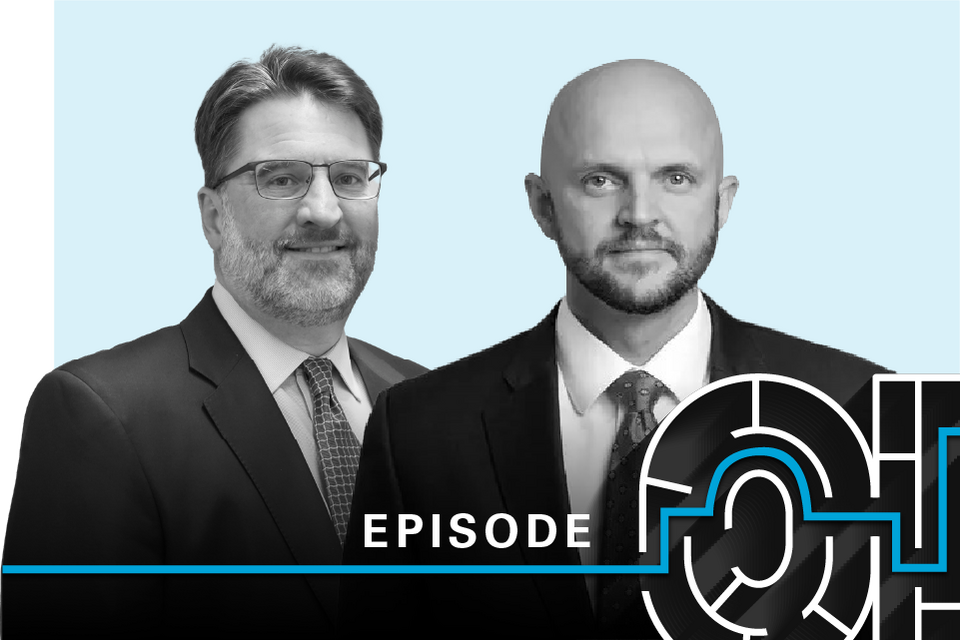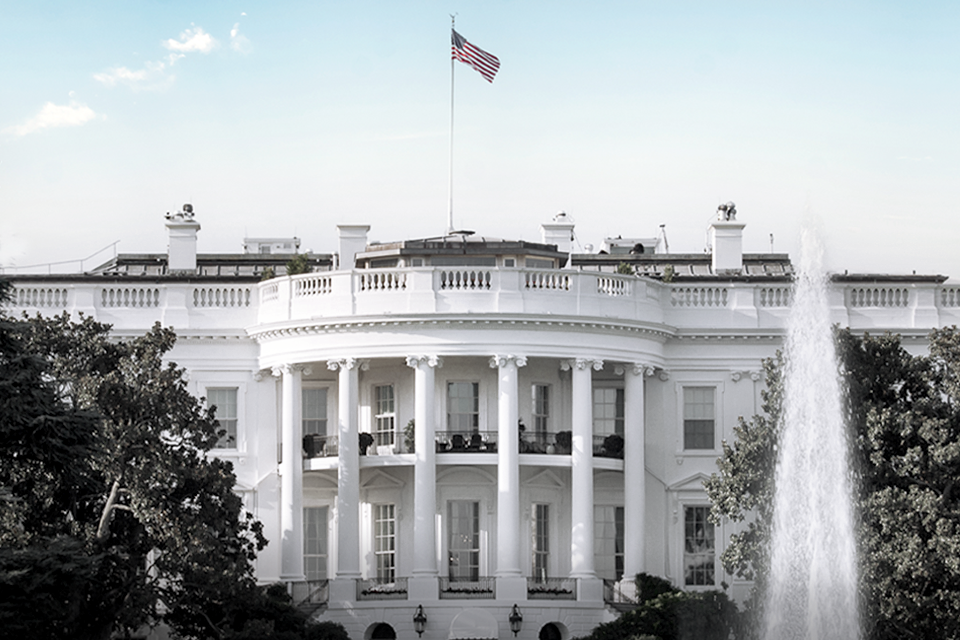01: The fate of tax incentives for the energy transition
An exploration of Trump’s policy agenda and the hurdles it may face

“The First 100 Days” is a podcast that explores the legal, regulatory and policy implications that the new US administration may have on global businesses across industries. Hosted by Executive Committee member Eric Leicht, the series features our lawyers’ views on the topics that matter most to our clients.
An exploration of Trump’s policy agenda and the hurdles it may face

Will tariffs help rewrite the rules of international trade?

Speed bumps on the road to a lower carbon future

Economic tools advance US foreign policy and national security goals

How “America First” policies may impact mineral and hydrocarbon supply chains

Some, but not all, investors may face a friendlier climate


Managing the legal impacts of a new US administration


How "America First" policies may impact mineral and hydrocarbon supply chains
Listen and subscribe
In this episode, partners Rebecca Campbell and Jay Cuclis consider how the administration's "America First" policies, articulated in executive orders, tariffs and other actions, may play out in the distinct cases of mineral supply chains and hydrocarbon supply chains. Rebecca co-leads the Firm's Mining & Metals industry group, and Jay co-leads our Energy industry group. This episode explores topics including the biggest concerns for mining and energy companies, and how they can navigate the changes ahead.
Listen now
Listen and subscribe Apple Podcasts | Spotify | YouTube Music | Amazon Music
Eric Hello, and welcome to "The First 100 Days," a podcast from White & Case that features our lawyers' views on the likely regulatory, legal and policy implications of the new administration on businesses operating across the globe and in various industries. I'm Eric Leicht, a member of the Firm's Executive Committee and a partner in our Debt Finance practice. Today, I'm joined by Rebecca Campbell, a partner based in London, and Jay Cuclis, a partner based in Houston. Rebecca, Jay, can you give us a quick overview of your respective practices? Rebecca Thanks for having us on the podcast, Eric. So, I have the pleasure of leading our global mining and metals practice, together with Gary Felthun. So, against the backdrop of everything that's happening in critical minerals, I think today is going to be a really interesting discussion. Jay My name is Jay Cuclis. I'm the Global Co-Head of the energy group at White & Case. And historically, my practice has been focused on major projects and M&A transactions in the energy industry. This, you know, typically would include buying and selling oil & gas assets both in the US and overseas, as well as development of petrochemical, pipeline, LNG and carbon capture projects. And over my career, I spent five years working in Europe and eight years working in Asia. So, my practice has had a substantial international focus, but all centered on the energy industry. Eric Thank you both. Let's go ahead and get started. There's been a lot of talk, including on this podcast, about the ways in which the Trump administration's "America First" policies will be felt across various sectors. Today, we're going to look at the implications for the mining and energy sectors, particularly hydrocarbon energy. While both sectors share a reliance on natural resources, the impact of these new policies will be different for each. I'll start with you, Rebecca. Could you set up that distinction for us? Rebecca So, I think the major distinction in today's discussion is going to be between hydrocarbons, in which the US in particular does have prolific resources and has in fact done a lot over the last 20 or so years to really reinvigorate its domestic energy production, something which I know is very close to Jay's heart, versus critical minerals, where the story is quite different. And on the minerals front, the US is far from self-sufficient when it comes to most minerals and in particular what we call critical minerals, which are minerals that are essential to the future of the global economy, with a particular emphasis on defense and energy transition. Eric So, what minerals are we talking about when we refer to critical minerals or rare earth minerals? Rebecca It's a great question, and I won't bore everyone with the periodic table here. But I think the most important thing is that the definition of critical minerals is continuing to change. In fact, different countries have different definitions of what's critical to them. We'll talk a little bit more about the most recent Trump administration executive order later on in the podcast. But one of the most important things that has happened there is the addition of copper to the list of critical minerals for the US, where it was previously not there. The US list has previously focused largely on more niche energy transition minerals and also rare earth elements. Rare earth elements, for a lot of them, more than somewhere between 80 and 90 percent of current global production is actually centered in China, which is why they have been a focus of particular attention from a mineral security perspective. Eric Rebecca, let me stick with you for just one last question and then I'll go to Jay. We talked a bit about self-sufficiency and what factors limit the US ability to be self-sufficient when it comes to these critical minerals. Obviously, the production is huge in China, as you've just described. Is it the absence of mines? Is it the absence of processing? What's hindering US development? Rebecca The first and foremost limiting factor is geology, right? So, not all of the things that are critical are geologically present in economically mineable amounts in the domestic US, but that is only part of the picture because the US, like a number of other OECD countries around the world, has also struggled for well over a generation to bring new mines into production, largely as a result of permitting and land issues. So, if you could draw a contrast between, for example, the US and the EU, who have very limited amounts of primary production that have come online in, say, the last generation, compared to other OECD jurisdictions like Canada and Australia, which are traditionally seen as mining-friendly jurisdictions where they have different regulatory processes in place that have allowed mines to be permitted, built and operated over that same period of time. Eric Understood. Let me turn to you, Jay, and let's address some of the same questions in the hydrocarbon world. What are they? Is the US self-sufficient? Do we face some similar challenges here in the US that Rebecca has described for the critical minerals? Jay Eric, I think, as Rebecca described, there's really a fundamentally different dynamic at work in the hydrocarbon industry in the United States. With the advent over the last 10 to 20 years of unconventional methods of extraction, particularly fracking, the US has emerged as one of the leading producers of oil & gas. So, there's plenty of domestic supply for the US to rely on. So, in other words, relative to some of the minerals that Rebecca was talking about, the US has more tools at its disposal when it comes to hydrocarbons because of the availability of relatively inexpensive reserves in the US and extensive transportation systems to move those molecules around the country. Eric Let's talk a bit about the executive orders, which have been coming fast and furious. Trump has signed numerous executive orders, several of which address critical minerals and energy production. Turning first to Jay, these executive orders reflect a departure from the Biden administration's approach to energy and climate change. Some key changes include, as I understand it, ending Biden's pause on approvals for liquefied natural gas, or LNG, exports and easing restrictions on oil & gas production. The obvious result would seem to be an increase in LNG and fossil fuel projects. Is that, in fact, what you're seeing or expect to see, Jay? Jay Well, Eric, the short answer is yes. We are seeing a marked increase in fossil fuel transactions, both in the traditional oil & gas industry and in the LNG sector. For example, as you mentioned, with Trump's lifting of the LNG export ban, domestic producers of gas now see new opportunities to access LNG export markets and foreign players see an expanded ability to acquire US LNG, as well as to invest equity in US liquefaction projects. So, from my perspective, the new administration's policies really mark a significant shift in favor of the fossil fuel industry, as evidenced by the loosening of regulations on fossil fuel development, as well as the general weakening of government support for certain renewable projects, particularly with regard to offshore wind. Eric Yeah. So, is there a downside now for the hydrocarbon sector? More drilling means lower oil prices, plus many fossil fuel companies have invested heavily in carbon capture utilization and storage projects. Those don't happen without government support. So, is this all upside, or? Jay No, I think there are some downsides. You know, "drill, baby, drill" sounds good as a general proposition. But the net result of that is increased production and lower oil & gas prices, which may not be as favorable to the oil & gas industry. And it also creates potential for new entrants into the market who may not have the same experience and capabilities as many of the established hydrocarbon companies. So, as you noted, many of these oil & gas companies have devoted substantial resources to energy transition projects. And some of those could well be adversely affected by policies of the new administration. Though, my own view, Eric, is that the administration, while strongly supporting fossil fuel development, will also hopefully take a more nuanced approach to energy transition projects, favoring some and disfavoring others. Eric So, I'm going to turn now to critical minerals. Trump signed an executive order entitled "Immediate Measures to Increase Mineral Production," which positions critical minerals as a national security imperative. Rebecca, what can you tell us about that executive order and its likely impact? Rebecca Well, its impact is pretty wide-ranging, and there's been an immediate and very positive reaction from a lot of those in the US who are currently trying to bring new mines online. A lot of the barriers to bringing new primary production online has been due to the lack of access to permitting and land for a lot of these projects. I think one of the most important things to note upfront is, in addition to the preexisting definition of critical minerals which had been established under the Biden administration, the list now includes uranium, potash, gold and copper, and also includes the ability for the Chair of the National Energy Dominance Council to add other minerals to that over time. And then there's a set of rapid-fire actions under the executive order being directed out towards a broad array of federal government agencies relating to, first of all, identifying, effectively, a short list of projects requiring immediate support, clearing permitting backlogs, making federal land available. And I would note that there's a number of quite prominent projects whose development has been constrained by the failure to make available federal land for the mine sites. And then also a whole program around putting in place financing tools to support the development of these projects. A lot of these projects don't necessarily sit in the hands of major mining companies. They are held more by junior and mid-cap mining companies. Not all of them, but a number of them are. And those companies rely very heavily on project finance and will rely quite heavily on these sort of government-backed financing programs in order to bring the projects to reality. We have seen various other efforts over the years to try and unlock domestic primary production in the US. So, the proof is going to be in the actual digging over the next couple of years. Eric Give me a sense about what this means in practice in the, sort of, the timeline for permitting, getting a mine up and running. Are we talking about one year, two years, more? How does this work? Rebecca No. We wish. We wish, Eric. So, the average timeline to bring a project through the permitting and land processes in the domestic US has been over ten years in recent times. There're famous projects like the Resolution project, a very, very prominent copper project owned by two major mining companies, BHP and Rio Tinto, where we were trying to get the relevant permitting and land requirements well over a decade ago when I was at BHP myself. And that project still doesn't have all of the land rights that it needs to proceed. The average time frame to bring a project to market is still well north of five years, and closer to ten years in a lot of other jurisdictions, but the US has been a particular logjam area. Europe has been the other one. And I know we're going to talk a bit more about Europe later in the podcast. Eric A couple of quick follow-up questions. How did China get so far ahead of us? Did they have better technologies that allowed them to step in? Is it just fewer roadblocks around permitting that have led to their dominance? Rebecca China is dominant in the production of a few minerals. So, for example, rare earths. But where China actually dominates the entire global minerals supply chain is that they have about 60 percent of the world's global processing capacity across all minerals. And so, the investment that China has made over the past generation in building processing, smelting, refining capacity across all of the major minerals is the thing that brings it to its place of dominance across most minerals and metals at the moment, because China sets the price. Eric You mentioned that there are quite a few junior and mid-cap mining companies. Would you foresee a roll up of these in the coming years in order to try to gain more efficiencies in terms of the development of mining and processing, et cetera? Rebecca Well, it's a very significant ongoing debate as to what kind of M&A activity we're going to be seeing in the sector, particularly over, say, maybe not the next 12 months, but maybe over the next 24 months as we start to see the impact of the changes being brought in by the Trump administration, whether they really start to take hold. But certainly, there's a number of projects that, especially if they get permitted and they get their land rights, will be ripe for the picking. And most of these companies are listed either in Canada or the US, so ripe for public takeover. Eric Right. There's some general language in the "Unleashing American Energy" executive order that directed the Secretary of Commerce to look at national security implications of the nation's mineral reliance. How do you see that impacting the demand for minerals like lithium, cobalt and nickel with the US EV production market having driven so much of that demand? Rebecca Yeah, it's an interesting one, I think this will have implications for the balance between EVs versus hydrocarbon-fueled vehicles, over at least the term of this administration. However, in terms of minerals like lithium, cobalt and nickel, the rest of the world continues to be going quite strongly towards EVs and to be quite strongly supporting the energy transition. So, if you look at Chinese electric vehicle production, which is by far the biggest source of electric vehicle production globally, they're not slowing down. So, I would say that the pricing for lithium, cobalt and nickel, and again, these are globally priced commodities, is it will be affected to some degree. But I think, it's actually the global demand for energy transition minerals that is largely going to set the price. Eric Yeah, it is extraordinary. I've read some of the statistics around how, in ten years' time, China will largely be EV driven based on the current trajectory. So, I wanted to move to the topic of tariffs as well. Trump has imposed and changed course on tariffs on various countries. Could each of you tell me how you see these tariffs impacting companies and project economics in each of your sectors? Maybe we'll start with Jay. Jay Yeah. I think in the hydrocarbon sector, Eric, there are several impacts. I mean, the most obvious one is that the costs of imported equipment needed for the energy industry will increase, assuming these tariffs stick, which could result in higher energy prices for consumers. And, depending on the nature of the tariffs, there could be an even more significant impact on renewable energy projects because those are highly dependent on many imported materials to construct those projects. So, a lot of those projects have very challenging economics, and adding cost to the project development makes the economics even more challenging for those types of projects. And I think there's also the very real risk, as we've already seen, of reciprocal tariffs affecting US exports. So, in terms of modeling economics, companies are going to have to consider these tariffs, or the reciprocal tariffs could have a substantial impact on costs and profitability. I think it is going to impact project development and has a potential to have a chilling effect on project development because of the uncertainty of future costs. Eric Yeah, understood. And Rebecca, tell me about in the mining sector, similar chilling effect potentially? Rebecca So, the impact of tariffs is quite different for the mining and metals sector in that, obviously, we have talked quite a lot about primary production, and so what Jay just described in terms of increased costs for primary production and also metal production in the US does ring true. But there's also the fact that there are large flows of metals and metal products coming into the US more generally to support industry. And so, for a lot of our clients who are trading in those metals or importing those metals or selling metals into the US car and aviation sectors, there're some very, very important immediate impacts on various of those clients. So, what are people doing right now? I'm hearing a lot of let's just wait for the dust to settle before taking any immediate long-term, strategic changes in the way in which people are operating their businesses because, obviously, the environment is very volatile right now, and there's no certainty as to where we're going to end up on a lot of these tariffs. The other interesting thing that we're hearing stories of is around traders and other market participants moving metals inventories into the US, and even if those inventories may not ultimately be sold into the US, moving them either physically or via the trading platforms into, kind of, the US perimeter, so that as and when tariffs do come into place, there won't be an immediate impact on those inventories. So, the other knock-on effect of that is, as and when tariffs do come in, we can probably expect that the impact on metals prices for the domestic consumer ultimately in the US is going to be a little bit delayed. Eric Let's talk a bit about the implications outside the US. How are both fossil fuel and mining companies around the world reacting to the volatility in the US and the challenge of being stuck in the middle, perhaps, between the US and China? Jay Well, Eric, I think volatility in general affects project development in the energy sector, because these large-scale energy projects are very capital intensive, often involving billions of dollars of investment. And so, when you have that uncertainty or volatility, it just creates concerns about forward planning and economic modeling. And so, I think there will be some impact on project development. Though, of course, some companies will look to find opportunities in this volatility. That being said, though, most of these companies, because of the magnitude of these investments, take a long-term view. And when I say long- term, I mean more than just one administration. They're looking out decades because an LNG project might have a 40-year shelf life. And I think while in the short term it may cause companies to pause or take a slower approach with regard to investment because of the volatility in the US, I think most of those companies are going to take a long-term view, and maybe once the dust settles with some of these new policies will move forward with their projects. Eric Interesting perspective. Rebecca? Rebecca So, China has led the way for over a generation on supporting mineral supply chains, metal production, and has used that to feed into the growth of its own economy. And so, this whole conversation that we're having here today is about the rest of the world catching up in many ways. So, it is interesting when we see that many of the techniques that China has adopted, as I say, for over a generation now starting to be emulated around the rest of the world. Eric So, picking up on that, the EU recently approved its own list of critical mineral projects to foster European domestic production. What impact do you think this will have within and outside the EU? Rebecca The critical raw materials strategic projects list was obviously very recently announced by the EU, and some could say that its announcement was triggered by President Trump's executive order on critical minerals. It may have, sort of, brought the announcement out because it had been hotly anticipated for many months. One of the things you see when you look at that list is that you can see it has been developed almost under the previous mindset and is very heavily focused on energy transition minerals and trying to foster primary production in the EU of those kinds of minerals. I think it would be very interesting to see, again, over the coming months, and when the next tranche of these strategic projects are announced, what else we see given the shifting agenda in Europe. Eric Alright, now I want to turn to the US-Ukraine revenue sharing deal on Ukrainian critical minerals. Rebecca, what kind of impact would such a deal have on the ability of the US to be more self-sufficient in this sector? Some of what I've heard is that, yes, there are critical minerals there. But it's one thing to own the land, it's another thing to actually extract it. Rebecca Well, Eric, I think the major purpose of the deal between the US and Ukraine appears to be to collect mineral-related revenues of Ukraine into a US-Ukraine controlled fund, which will support postwar reconstruction and economic development in Ukraine. So, whilst the headlines say the US is gaining access to the critical minerals of Ukraine, I think the devil really is in the detail. If the US does secure rights to purchase Ukraine's mineral production as one of the terms of the deal, then Ukraine's mineral endowment could indeed be a valuable source of supply for the US. There's obviously significant production of a number of important minerals already out of Ukraine, such as potash and iron ore. And it's thought that Ukraine has a lot of prospectivity for other minerals. Eric A new administration is obviously a time of change, but change doesn't happen without a back story. There are drivers for any policy shift. Could you give us some historical context for what's happening today, especially since we've got Trump's first term as a guide? Jay Eric, I think in the hydrocarbon industry there's probably some degree of a backlash against the villainization, if that's a word, of the traditional oil & gas industry. You know, Trump seems keen on resetting the table, "Making America Great Again." And part of that, I think, in his mind, means reverting to a more hydrocarbon-focused economy. And I think a lot of people in Trump's orbit have been skeptical about some of the impacts on the environment of hydrocarbon use. Whether you agree with that point of view or not, it clearly is a motivating factor in terms of the approach that the Trump administration is taking in terms of support for those energy transition initiatives. Eric And isn't some of it around energy prices as well? That was a big focus—significant inflationary pressures, the cost of energy going up, green energy costs more. It seems like that was part of Trump's mandate to come in and try to bring down prices and perhaps hydrocarbons can play an important role in that. Jay Yeah, that was obviously a key campaign issue for Trump, and a key attack line against Biden was the increase in costs and inflation generally. And one of the areas where you could have a pretty dramatic impact on inflation is if you can cut hydrocarbon energy costs for the American consumer. That's going to have an immediate impact, so yeah, I agree that's also part of the motivation here. Eric And, Rebecca, taking a look at Trump's first term and looking at the historical context, what do you see in terms of the policy shift here? Rebecca Yeah, here again the drivers in the mineral sector, I think, are quite different to the energy and hydrocarbon space. Because first of all, I'm pretty sure that any consumer who knows the price of a ton of copper versus any consumer who knows the price of gas. We know that there's going to be a huge difference in the numbers on each side of that equation. So, it's less something that's directly relevant to the administration and their base. And I think much more about the broader context of wanting to ensure the security and independence and the slightly more isolationist approach of the new administration. Eric Yeah, although I can certainly see how the larger populace could appreciate policies that stand behind national security given some of the geopolitical threats on the horizon. Rebecca Yeah, agreed with that. Eric You've both seen a number of administrations come and go. How would you characterize the changes occurring and expected to occur during this administration? Are they going to be transformative for business and your clients? Rebecca So, with the exception of a few clients who have projects in permitting in the domestic US for which some of these changes could be quite transformative, I would say for most of our clients it is more a case of just adopting a little bit of a wait-and-see approach, not being too reactionary. We are spending a lot of time with clients as we move from a world where we used to talk about regulatory uncertainty or ambiguity, and now we talk a lot more about regulatory volatility. And we are spending a lot of time with clients helping them navigate that, anticipate that. And, obviously, not just risks. There're a lot of opportunities associated with some of the regulatory volatility that we're talking about. So, overall, I think, given the focus on critical mineral production and on tariffs, the general direction of travel is that the US is going to be, and the domestic US is going to be, more of an opportunity for investment in the mineral sector over the course of the administration. And we are already seeing a lot more activity, not just around primary production, but also around clients looking to bring processing capacity into the domestic US in terms of where they're going to house their greenfields processing capacity over the coming years. Eric Jay? Jay Well, your comment about seeing many administrations, I'll say that Ronald Reagan had just been elected president when I started practicing law. So, yes, I have seen a few administrations. Rebecca I wasn't even born, Jay. Jay Now you're really dating me. But I have to say, though, that this has been a unique administration in many respects. So, predicting the impact is going to be challenging. But I do think there's going to be a transformative shift in terms of US energy production and US energy transition initiatives. For the traditional hydrocarbon companies, there are likely to be continuing reduction of regulations, a boost of domestic supplies and increased opportunities for LNG exports. And I think clients are going to have to adopt strategies to deal with those new realities in the oil & gas and energy transition industries. You know, I think for energy transition it's going to be more challenging, frankly, because US government support is going to dry up for certain categories of projects. But I think it will be maintained in others for a variety of reasons. And so, I think the critical thing for our clients is going to be having access to good information quickly on how these policies are being rolled out and then being nimble in adopting strategies to react to those policies. Eric So, as we look to close out this podcast, it'd be helpful to get a top take away from each of you. So, a takeaway for your clients. Rebecca Invest in US primary production. Jay I think, Eric, the key thing for clients is just to be prepared to deal with continued volatility in terms of the new administration's energy policies and be prepared to take actions quickly based on those policies as they roll out. I think specifically what they're going to need to do is be able to implement changes to their project development and economic models based on the different cost profiles that are going to be created by these new policies. Eric Rebecca, Jay, I'd like to thank you both for joining today. It will be fascinating to watch how the new administration's focus on national security and self-sufficiency will influence the approach of our clients. And how clients, in turn, look to exploit the opportunities that are likely to follow. Rebecca Thanks for having us. Jay Yes, thank you. Eric Thanks for listening. Please subscribe in your preferred podcast app so you don't miss future episodes. Until next time.
For those of you who are not aware, rare earth minerals are actually not all that rare, in terms of how they're found in the Earth's crust. But it is quite difficult to find them in, sort of, economically extractable concentrations. And they're used in high-end electronic applications. They're used in defense. They're used in things like wind turbines. So, not a lot of them are needed to support these important parts of the global economy, but they are essential.
In fact, there're other parts of the global economy that foresaw this ahead of the US. Whereas if we look, say, somewhere like Europe, I think Europe has been focused upon critical minerals almost entirely from an energy transition perspective. And that conversation has obviously shifted very rapidly in recent months to also being focused not just on energy transition, but to add national security and defense as a very important driver of these mineral security discussions.
Additional publications
White & Case means the international legal practice comprising White & Case LLP, a New York State registered limited liability partnership, White & Case LLP, a limited liability partnership incorporated under English law and all other affiliated partnerships, companies and entities.
This podcast is prepared for the general information of interested persons. It is not, and does not attempt to be, comprehensive in nature. Due to the general nature of its content, it should not be regarded as legal advice.
© 2025 White & Case LLP